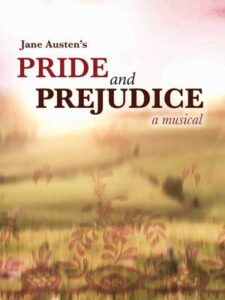Pride and Prejudice - A Musical
By Lindsay Warren Baker & Amanda Jacobs

Music
Selections from the score may be listened to while opening the various other components in pdf.
Script
Download or open The Full Script in Adobe Reader.
Score
If you are interested in this work and would like to talk with the creators, please email your request to info@mainstreetmusicals.org. Please include: Name of Show, Your Name, Name of Your Company or School. Thank you.
SYNOPSIS
Jane Austen’s Pride And Prejudice, A Musical
ACT ONE. One afternoon, at her home in Hampshire, England in the year 1811, Jane Austen receives a letter from the publishers of “Sense and Sensibility.” They have invited her to submit a new manuscript (GOOD NEWS). Austen’s sister, Cassandra, encourages her to submit her story “First Impressions.” Austen doubts whether something she wrote almost fifteen years ago is worth submitting. As she and Cassandra re-read the work, the novel’s characters come to life in the sisters’ imaginations.
In her story, a wealthy young man named Charles Bingley arrives in the neighborhood and becomes enamored with Jane Bennet, the eldest of five sisters (ISN’T SHE WONDERFUL?). Mr. Bingley is accompanied by his snobby best friend, Fitzwilliam Darcy, who is even wealthier than he is. Mr. Darcy rejects everything about the country neighborhood, including Elizabeth Bennet, the second eldest Bennet sister. Elizabeth is offended by Mr. Darcy, but is excited for her sister, Jane. Elizabeth questions the nature of love, romance, and what she wants in a potential partner (WHEN I FALL IN LOVE).
Jane Bennet receives an invitation to visit Mr. Bingley’s sister, Caroline (MY DEAREST JANE - FIRST LETTER). Mrs. Bennet is thrilled with the invitation and schemes to keep Jane at the Bingley’s home as long as possible to the wonderment of Mr. Bennet (SILLY GIRLS). While at Netherfield, Jane becomes ill and Elizabeth cares for her. Over the next four days, Darcy becomes increasingly intrigued with Elizabeth, though Elizabeth is confused and exasperated by his “attention” (HE THINKS/SHE THINKS).
When the Bennet sisters return home, they learn that their pompous cousin, Mr. Collins, is to visit the family (MEETING MR. COLLINS). Mr. Collins will inherit the Bennet estate, which creates tremendous pressure for all five daughters to marry well, but Mr. Collins is aware of his duty both to the Bennets and to his patroness (LADY CATHERINE DE BOURGH). As the author, Austen has encouraged Mr. Collins to pursue Elizabeth. However, when Austen is inspired to introduce a new character – a handsome officer, George Wickham (MEETING MR. WICKHAM) – Elizabeth’s attention is engaged elsewhere. Wickham shares his past with Elizabeth (MY DREAM), and her prejudice against Mr. Darcy increases.
Austen questions her plot choices and examines the interactions between all of the growing romantic relationships at a party held by the Bingleys (THE NETHERFIELD BALL). Following an embarrassing evening, Elizabeth rejects a proposal of marriage from Mr. Collins to the dismay of Elizabeth’s mother (MY POOR NERVES). While Elizabeth could never marry someone she does not respect, Cassandra reminds Austen that there are those who choose to marry for convenience. The sisters uncomfortably discuss a similar marriage proposal from their past, and Austen imagines what would happen if Elizabeth’s best friend, Charlotte Lucas, were to marry Mr. Collins (NOT ROMANTIC).
Jane Bennet is informed that the Bingleys and Mr. Darcy have left the neighborhood (MY DEAREST JANE – SECOND LETTER) and Elizabeth is invited to visit the newlyweds, Charlotte and Mr. Collins. During this visit, Elizabeth meets Mr. Collins’ condescending patroness, Lady Catherine de Bourgh and is re-introduced to Mr. Darcy, who is also Lady Catherine’s nephew.
After several encounters, Mr. Darcy proposes to Elizabeth not realizing how much she hates him – not only because of her feelings for Wickham, but because of the news that Mr. Darcy separated Mr. Bingley from her sister, Jane (THE REFUSAL). Austen is excited about the dramatic potential, but Cassandra is horrified by the turn of events. Their disagreement over the story escalates into an argument about their own lives and Act One ends with cruel words spoken between the two sisters.
ACT TWO opens with Austen frustrated and upset by the negative consequences of reviewing “First Impressions” (SECOND CHANCES). She and Cassandra begin to repair their relationship, but Austen is unsure of what to do with the story. She attempts to reconcile her new ideas with the old ones. Austen determines that Mr. Darcy should seek Elizabeth out one more time (TAKE A WALK) in order to explain his actions (DARCY’S LETTER). Elizabeth is humbled when she accepts the truth (HAD I BEEN IN LOVE).
Austen continues to see where her creativity will take her, and Elizabeth returns home to discover that the soldiers are leaving her neighborhood. Austen decides to send Lydia with them much to Kitty’s dismay (I CAN’T RESIST A REDCOAT). Meanwhile, Elizabeth is invited to journey north with her uncle and aunt, and they visit Mr. Darcy’s home. While she’s there, Elizabeth recognizes how mistaken she was about Mr. Darcy (THE PORTRAIT SONG), and when Mr. Darcy appears unexpectedly, their romance begins.
Cassandra is relieved by the reconciliation between Elizabeth and Darcy, but Austen is still not convinced that the story is truthful enough (THE STORY IS NOT FINISHED YET). Austen chooses to test her leading characters by having Lydia run away with Mr. Wickham. Elizabeth realizes that she is in love with Mr. Darcy, but fears the scandal has destroyed her chances with him (WATCH HIM GO). Meanwhile, Lydia and Wickham “enjoy London” and rumors of the scandal spread (WHAT NEWS).
Mr. Bennet returns home with news of Lydia’s pending marriage to Mr. Wickham. Austen informs Elizabeth that it was Mr. Darcy’s doing, and Bingley returns to propose to Jane Bennet (I THINK YOU’RE WONDERFUL).
Mr. Darcy’s aunt, Lady Catherine, disturbed by rumors of a possible engagement between her nephew and Elizabeth, appears in order to confront Elizabeth with her objections. Elizabeth denies the engagement, but will not promise to reject Mr. Darcy if he proposes. Thwarted, Lady Catherine tries to extract the same promise from Mr. Darcy but fails. Darcy is left with the hope that Elizabeth will give him a second chance and begs Austen for another opportunity (FINE EYES). Recognizing the openness of Darcy’s heart, Austen reflects on the miraculous, unselfish nature of love (ROMANTIC) and re-unites the hero and heroine. She shares her joy with Cassandra and decides that not only is “First Impressions” is worth submitting for publication, but that she wants to be the kind of writer who speaks the truth about matters of the head and the heart (FINALE).
NOTES
To save the script to your computer click with the right mouse button. A small menu should appear select "save target as" or "save to your computer," or "save link as." The exact text may vary depending on your browser.
THE CREATIVE TEAM
 Lindsay Warren Baker is a freelance theater artist: stage director, playwright/composer, teaching artist and yoga instructor. Besides Jane Austen’s PRIDE AND PREJUDICE, A Musical, additional writing credits with collaborator Amanda Jacobs include LILY, A Musical Portrait; TRUTH IN BEAUTY: A Shakespeare Sonnet Project (2012 Penfield Music Commission Project);and DANIEL, The Musical. Ms. Baker’s other theatrical work includes professional engagements with Geva Theatre Center (Rochester, NY), Eastman Opera Theatre/Eastman School of Music, SUNY Geneseo, Rochester Lyric Opera, and the Ohio Light Opera. Education and Training: O’Neill National Theater Institute, Moscow Art Theatre, St. Olaf College, SUNY Empire State College.
Lindsay Warren Baker is a freelance theater artist: stage director, playwright/composer, teaching artist and yoga instructor. Besides Jane Austen’s PRIDE AND PREJUDICE, A Musical, additional writing credits with collaborator Amanda Jacobs include LILY, A Musical Portrait; TRUTH IN BEAUTY: A Shakespeare Sonnet Project (2012 Penfield Music Commission Project);and DANIEL, The Musical. Ms. Baker’s other theatrical work includes professional engagements with Geva Theatre Center (Rochester, NY), Eastman Opera Theatre/Eastman School of Music, SUNY Geneseo, Rochester Lyric Opera, and the Ohio Light Opera. Education and Training: O’Neill National Theater Institute, Moscow Art Theatre, St. Olaf College, SUNY Empire State College.
 Amanda Jacobs, initially trained to be a pianist. Her life led her to composition and playwriting where she is most recognized for her award-winning work on “Jane Austen’s PRIDE AND PREJUDICE, A Musical”, which swept the New York Musical Theater Awards in 2011, and included the coveted "Stage Entertainment Award. Outside of Musical Theater, Ms. Jacobs has won numerous composition awards, including 1st Prize from the Long Island Arts Council (2009), the Marin Lutheran Church Competition (2009), Celebrating Grace (2009), NATS (2001), as well as international recognition for her “MASS for the LIVING” from the Sacred Arts Foundation (2010).
Amanda Jacobs, initially trained to be a pianist. Her life led her to composition and playwriting where she is most recognized for her award-winning work on “Jane Austen’s PRIDE AND PREJUDICE, A Musical”, which swept the New York Musical Theater Awards in 2011, and included the coveted "Stage Entertainment Award. Outside of Musical Theater, Ms. Jacobs has won numerous composition awards, including 1st Prize from the Long Island Arts Council (2009), the Marin Lutheran Church Competition (2009), Celebrating Grace (2009), NATS (2001), as well as international recognition for her “MASS for the LIVING” from the Sacred Arts Foundation (2010).